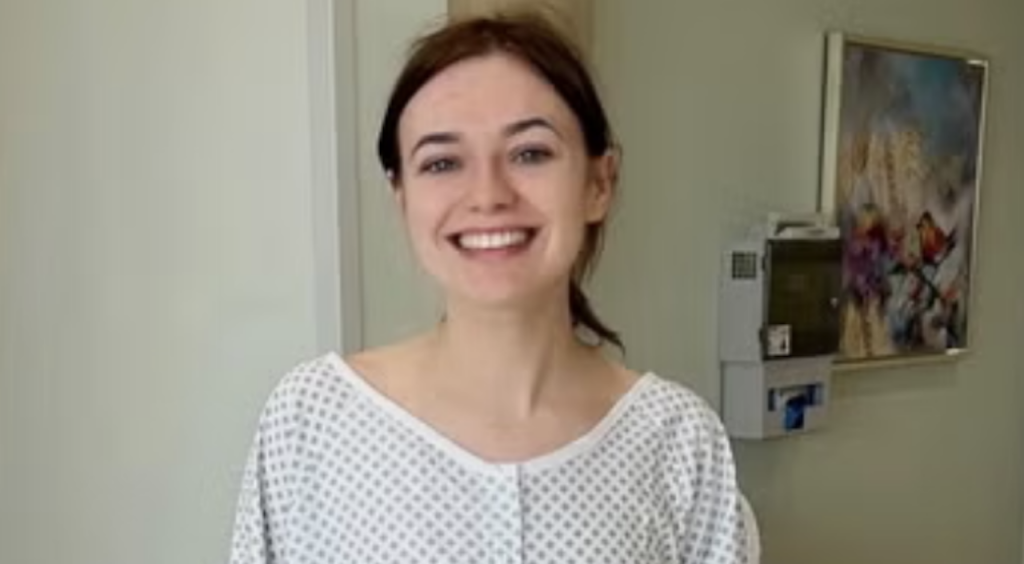Avoiding Misdiagnosis: Why Multiple Opinions Matter
- Chloe Bremner was told she had Irritable Bowel Syndrome for years suffering with “excruciating pain,” but it turned out to be endometriosis. Now she’s sharing her story to help others advocate for themselves and seek multiple opinions when it comes to your health.
- Endometriosis is when tissue, similar to the tissue that normally lines the inside of the uterus, known as the endometrium, grows on the outside of the uterus. Though it can come with debilitating pain, it can often be difficult to diagnose.
- Irritable Bowel Syndrome (IBS) is, according to the National Institute of Diabetes and Digestive and Kidney Diseases (NIDDKD), “a group of symptoms that occur together, including repeated pain in your abdomen and changes in your bowel movements, which may be diarrhea, constipation, or both,” adding, “With IBS, you have these symptoms without any visible signs of damage or disease in your digestive tract.”
- Since the disease can be tricky to diagnose, women experiencing symptoms should consider seeking multiple opinions if they are not getting the answers they need about their health.
Endometriosis—which Bremner described in a recent interview as “so unbelievably mistreated and misunderstood”—occurs when tissue similar to the tissue that normally lines the inside of the uterus, known as the endometrium, grows on the outside of the uterus. It often brings debilitating pain and can often be difficult to diagnose.
Read More
She explained, “It’s excruciating, and to the point where I was on morphine every day, and it didn’t do anything. I was still in absolute agony.”
Bremner also suffered severe daily pelvic pain, painful and heavy periods, abnormal bleeding between periods, severe pain before and after sex, nerve and pain, as per The Independent.
Other symptoms she endured were excessive tiredness, brain fog, migraines, vomiting, acne, ruptured cysts, and recurring urinary tract infections.
More On Endometriosis
Bremner continued, “I was misdiagnosed for a really long time. One time I even went to the doctor, I’d got my period. I was vomiting. I was in absolute agony, and I was like, something’s wrong. And they said, ‘You’ve got a sick bug, go home.’
“But that was happening every four weeks. I wasn’t getting a sick bug every four weeks.”
It ultimately took the Bremner nine years to get a correct diagnosis.
She recounted a gynecologist wrongly likening the bloating she experiencing as Irritable Bowel Syndrome (IBS), which the National Institute of Diabetes and Digestive and Kidney Diseases (NIDDKD) explains as “a group of symptoms that occur together, including repeated pain in your abdomen and changes in your bowel movements, which may be diarrhea, constipation, or both,” adding, “With IBS, you have these symptoms without any visible signs of damage or disease in your digestive tract.”
Bremner, who also went to a different gynecologist who for another opinion, first began experiencing symptoms at age 14, didn’t get diagnosed with endometriosis until 2023.
She admits it’s “bittersweet” to finally find out her diagnosis, but it has evoke feelings of “anger” and “frustration” as so much time had passed before she finally got answers.
Bremner told The Independent how she ultimately had surgery the same year of her diagnosis, but still needed morphine when her pain was heightened.
As she continued to have pain, she was prescribed injections to induce menopause and hormone replacement therapy at age 24, something she says was unsuccessful.
She told the news outlet, “As my endometriosis progressed and I got more unwell, I coped by dissociating from my present life to survive. My life became small and isolated; I couldn’t face the reality of my situation.
“Dissociation helped me survive through the suffering, but I felt bitter towards those without endometriosis and with that came guilt.”
She managed to raise money via a GoFundMe page she created for surgery, which she admits, “Most of the time it doesn’t take away 100 percent of your symptoms, but it’s about reducing them to a stage that feels more comfortable.”

Prior to the operation, which she had done in Abu Dhabi, she explained on her crowdfunding page, “I am in need of a very complex and major surgery, with multidisciplinary team involvement, to which the NHS waiting list is a very long time for this operation due to the complexity and the other people in need.
“All I know for certain about my operation is that I need to get the endometriosis removed from all areas affected (reproductive organs, urinary organs and bowel) and especially from my ureter, which they will put stents in from my kidney to my bladder to remove the disease by cutting it out, in ureter endometriosis, it can damage the kidney so much you loose your kidney, I am at risk of this and need to have regular kidney scans. They have told me they think I will get better, but I need the surgery in order to do so.”
Bremner has since been doing better since her successful surgery.
She wrote via GoFundMe over the summer, “I was really raw and honest about my endometriosis online, but this I felt particularly grossed out that something(s) have been living in me for over a decade and I had no idea. However there is nothing I could have done to prevent it or nothing I could have done differently, that has given me some comfort.”
Bremner added, “I wanted to finish off by saying, I am keeping better than I was before and the difference in my endometriosis has been absolutely massive.
“Having both endometriosis and the schistosomiasis at the same time, was just horrendous, dealing with one is making things easier for me and I am learning how to navigate this. I’m back at work, in a position which is more suitable for me, in a new job. I went to the eras tour, which was amazing. Me and my sister are planning some time together for Leeds festival in August which will be lovely and we are both very excited, to have some fun!”
Learning More About Endometriosis
Although endometriosis may also present symptoms similar to endometrial cancer, it is “not cancer,” OB/GYN and oncologist at Cedars-Sinai Medical Center Dr. Bobbie Rimel previously told SurvivorNet.
“Endometriosis is the term for whenever those endometrial cells, those lining of the uterus cells, are outside of their normal place, which is inside the uterus,” Dr. Rimel explained, again adding that it is a benign condition, which means non-cancerous.
“Endometrial cancer is actually when cells of the lining of the uterus become cancerous and begin to invade the uterus wall,” Dr. Rimel continued. “[The cancer cells] may spread to the fallopian tubes, to the ovaries or the lining of the pelvis or elsewhere in the body.”
Be Pushy, Be Your Own Advocate… Don’t Settle
According to Johns Hopkins Medicine, endometriosis usually occurs on or near reproductive organs in the pelvis or abdomen, can be found in other areas such as the fallopian tubes, ligaments around the uterus (uterosacral ligaments), lining of the pelvic cavity, ovaries, outside surface of the uterus, space between the uterus and the rectum or bladder.
In rare circumstances, it can also grow on and around the bladder, cervix, intestines, rectum, stomach (abdomen), and vagina or vulva.
According to the WHO, “Endometriosis often causes severe pain in the pelvis, especially during menstrual periods. Some people also have pain during sex or when using the bathroom. Some people have trouble getting pregnant.
“Some people with endometriosis don’t have any symptoms. For those who do, a common symptom is pain in the lower part of the belly (pelvis). Pain may be most noticeable during a period, during or after sex, when urinating or defecating.”
Some may also experience:
- chronic pelvic pain
- heavy bleeding during periods or between periods
- trouble getting pregnant
- bloating or, nausea
- fatigue
- depression or anxiety.
Symptoms of Endometriosis
According to the World Health Organization (WHO), “Endometriosis often causes severe pain in the pelvis, especially during menstrual periods. Some people also have pain during sex or when using the bathroom. Some people have trouble getting pregnant.
“Some people with endometriosis don’t have any symptoms. For those who do, a common symptom is pain in the lower part of the belly (pelvis). Pain may be most noticeable during a period, during or after sex, when urinating or defecating.”
Some may also experience:
- chronic pelvic pain
- heavy bleeding during periods or between periods
- trouble getting pregnant
- bloating or nausea
- fatigue
- depression or anxiety
Pushing For A Correct Diagnosis
When it comes to your health, be a little pushy. You know your body better than anyone else. When you see a doctor for a problem, don’t hesitate to make sure that your question is fully answered and that you are comfortable with the plan moving forward. From a doctor’s perspective, every problem should have a diagnosis, a treatment, a plan for follow-up, and a plan for what happens next if the treatment doesn’t work.
RELATED: Comedian Amy Schumer Experienced Debilitating Pain Before Treatment for Endometriosis
As a patient, if you don’t feel like each of these four things has been accomplished, just ask! Even if it requires multiple visits or seeing additional providers for a second opinion, always be your own advocate.
The Importance of Being Your Own Advocate
Dr. Zuri Murrell, director of the Cedars-Sinai Colorectal Cancer Center, previously told SurvivorNet that healthcare guidelines are meant to do the right thing for the largest number of people while using the fewest resources.
“The truth is you have to be in tune with your body, and you realize that you are not the statistic,” he said.
Dr. Murrell told SurvivorNet that not every patient will “fit into the mold,” so it’s important to educate yourself and be your own health care advocate.
“Every appointment you leave as a patient, there should be a plan for what the doc is going to do for you, and if that doesn’t work, what the next plan is,” Dr. Murrell advised. “And I think that that’s totally fair. And me as a health professional that’s what I do for all of my patients.”
Contributing: SurvivorNet Staff
Learn more about SurvivorNet's rigorous medical review process.

